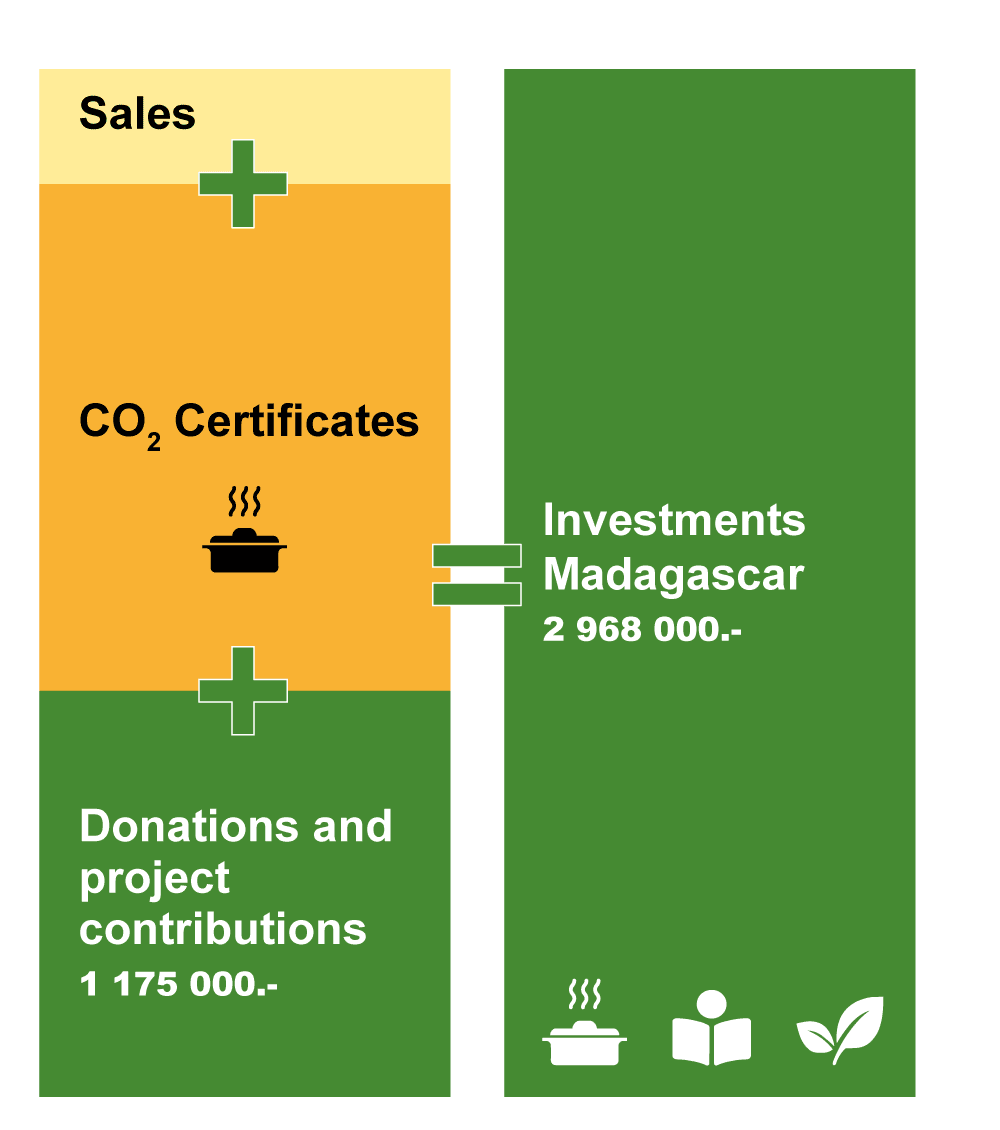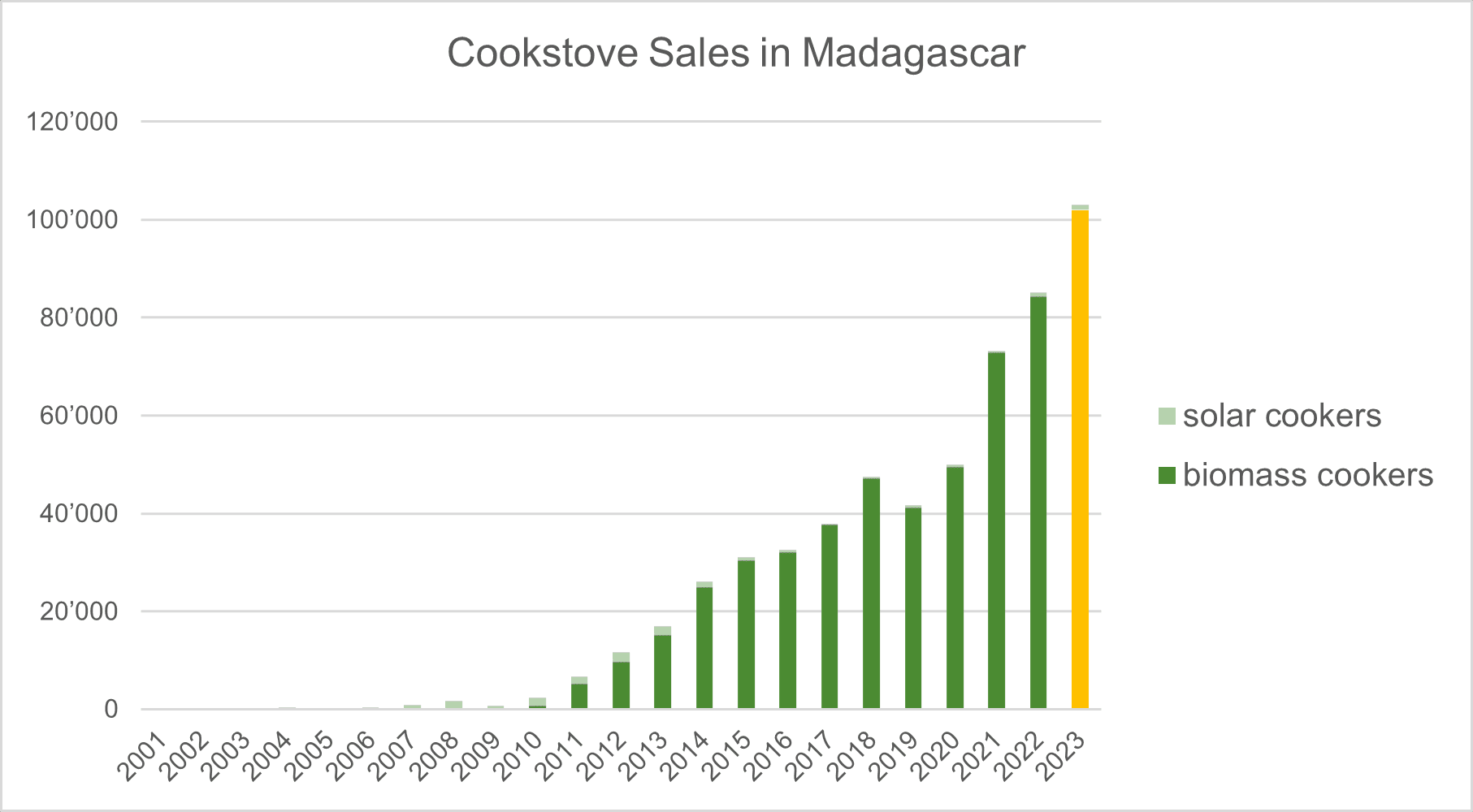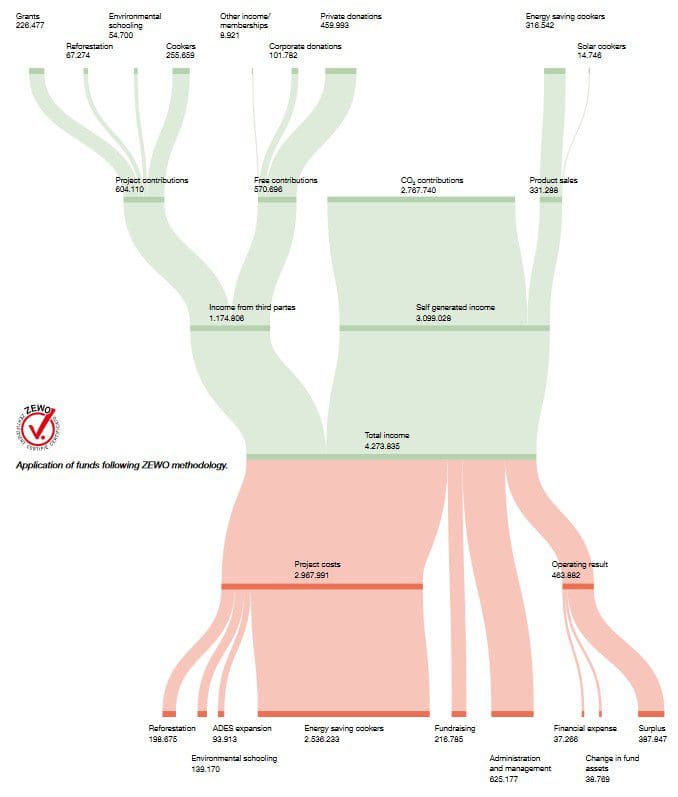How almost three Swiss francs arrive in Madagascar for every franc donated
The non-profit organisation ADES sells its cookers in Madagascar at a fraction of their cost. Donations amount to only about a third of the investments made. Nevertheless, ADES can show impressive growth and has a solid financing model, thanks to which three francs currently reach Madagascar for every franc donated.
In 2022, ADES received a total of CHF 1 175 000 in donations and project contributions from private donors and institutions. In total, ADES made investments of almost 3 million in Madagascar in the same year.[1] This money is used to pay the salaries of more than 250 employees, to maintain and expand its own infrastructure throughout the island and to finance the various activities of ADES. These include the production of solar and energy-saving cookers, reforestation activities and environmental education. But how is it possible for an NGO like ADES to invest so much more than it takes in through donations? While many NGOs rely entirely on donations for their funding, ADES has developed a model with diversified sources of income. ADES' income can be divided into three areas: Donations, sale of goods and CO2-Contributions.
[1] Cf. ADES, Annual Report 2022, pp. 20-22

Donations
In the first eleven years, ADES focused on the construction and distribution of solar cookers. Financing came mainly from donations. In addition to private supporters, ADES founder Regula Ochsner was able to convince institutions such as charitable foundations and church congregations of the effectiveness of the work early on. To this day, donations are an essential financing and identification instrument for ADES. Thus, in 2023, our organisation's reforestation, education and awareness-raising measures will be financed mainly by donations.
In 2022, ADES' donations came in similar proportions from private individuals, institutional donors such as foundations, and bequests. Slowly growing are contributions from corporate partners who implement projects with ADES as part of their sustainability strategy (in 2022 these amounted to around CHF 100,000). ADES would like to consciously promote this area in the future. In addition, there is international funding from EnDev (Energising Development), a partnership of various donor countries with the aim of promoting access to modern, climate-friendly and affordable energy.[1]. While private individuals mainly make general donations, contributions from foundations are often project-linked.
Sale of goods
ADES products are deliberately not given away in Madagascar. ADES sells all products at a greatly reduced price. By having people pay for the products, they are valued and used more carefully. Giving products away can also affect the self-esteem and dignity of the recipients. By paying for the products, Madagascans can meet their own needs and provide for themselves in the long term. This promotes personal responsibility, self-determination, autonomy and self-reliance.
Through sales, ADES also contributes to strengthening the local economy. The sale itself forms a link in the long value chain that ADES has created in Madagascar. In addition to 15 of its own locations throughout the island, ADES' distribution network includes more than 250 independent resellers who generate an income through this.
With the sale of more than 85 000 cookers in 2022, ADES generated total sales revenue of CHF 330 000.[2] This corresponds to an average price of just under CHF 3.90 per cooker sold. Even though the actual income from the sale of cookers is lower than income from donations or those from the sale of CO2-certificates, the many positive side effects confirm the approach of giving away the cookers cheaply, but not for free.
One criticism of the sales model with discounted ADES products aims in the opposite direction: by subsidising the sale of cookers, ADES distorts the market in Madagascar and makes it difficult or impossible for other cooker producers to sell their own products. There is no question that this criticism has a kernel of truth. However, without the discounted price, many Malagasy families would not be able to afford their own cooker. Moreover, there is no supplier besides ADES that can produce and sell large quantities of energy-efficient cookers in Madagascar in the near future. Competing products are mainly produced in very small quantities in backyard production and of low quality. To meet the high demand for energy-saving cookers (the government's official target is that seventy per cent of all Malagasy households use energy-saving cookers by 2030[3]According to our calculations, this results in a demand of around 500,000 cookers per year), there is currently no way around ADES. Since each cooker significantly reduces a family's wood consumption, and thus their expenditure and negative impact on nature, ADES is convinced that the positive effects of the discounted sales price for people and nature outweigh any negative effects many times over. To maximise its impact, ADES is continuously expanding its infrastructure, distribution network and employee base.
CO2-contributions
ADES solar cookers, once produced, reduce wood consumption in cooking to zero and are therefore an important means of protecting the forests in Madagascar. The production of the solar cookers is complex and expensive. Since cooking in the solar box cooker also differs significantly from traditional cooking on an open fire, the spread of solar cookers stagnated. ADES decided to adapt its strategy in 2009. Energy-saving cookers were to be fired from the clay of Fianarantsoa's rice fields. In 2010, ADES started the production of the energy-saving cookers and was able to reduce CO2-savings through the international certifier Gold Standard[4] registered. ADES was thus one of the first project developers to enable the then newly established myclimate foundation to set up certificate sales. Before the certificates, ADES had to pre-finance every cooker produced through donations, which made larger growth considerably more difficult - now it was suddenly possible to generate additional funds and thus drive the further development of the products without having to question everything again every year, as the income from donations is naturally much less calculable in advance. Since the income from CO2-As the number of cookers sold increased with the number of cookers sold, thus reducing the pressure on fundraising per cooker, these certificates made possible the impressive growth that ADES has experienced since then.
[1] Cf. https://endev.info/about-endev/
[2] Cf. ADES, Annual Report 2022, p. 22
[3] Cf. Energy Strategy of the Republic of Madagascar, p.39 (http://www.ore.mg/Publication/Rapports/NouvellePolitiqueDel%27Energie.pdf)
[4] Vgl.https://www.goldstandard.org/

ADES income and expenditure
Transparency is important to ADES. The cash flow diagram provides a detailed visual representation of all income and expenditure from 2022. The share of own resources (CO2-contributions and sales of goods) accounted for 72 percent of total turnover. Third-party funds (free donations and project donations) accounted for 28 percent. On the expenditure side, 70 per cent went to the projects, 85 per cent of which went to cooker production. The remaining 30 percent of the total turnover was divided between fundraising, administration and a profit. After ADES had closed the overall accounts with a calculated minus in previous years, it was important to build up new reserves again with the profit.

In upcoming blog articles, different actors will shed light on how the voluntary CO2-certificate market works, why companies develop and implement a broad sustainability concept for their company (and what role ADES can play in this) and what effect the money from CO2 certificates has in Madagascar.

